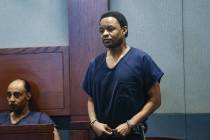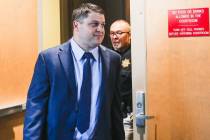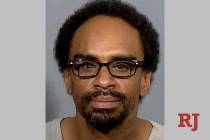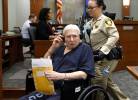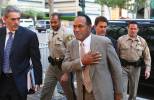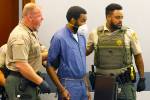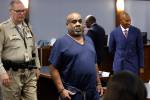Appeals court overturns death sentence in 1982 Reno murder case
A federal appeals court on Wednesday overturned the death sentence for state prisoner Tracy Petrocelli, a three-time convicted killer who first was found guilty of murder in a 1982 case that has had substantial influence on criminal procedure in Nevada.
Petrocelli has lived for more than a quarter-century on death row since he first was convicted of murder in the shooting death of James Wilson, a Reno used car salesman. Petrocelli shot Wilson after he fled Washington state, where five months earlier he had killed his 18-year-old fiancee, Melanie Barker.
His name was etched into state legal history books after his appeal of the Wilson murder conviction led the Nevada Supreme Court to establish a three-prong test for whether a defendant’s “prior bad acts” can be included in evidence at trial.
The decision Wednesday by the 9th U.S. Circuit Court of Appeals was largely unrelated to the prior bad acts issue that dominated Petrocelli’s early appeals.
The 9th Circuit instead ruled that the penalty phase of the Wilson murder trial represented a “flagrant violation” of Petrocelli’s constitutional rights, because it relied on testimony from a psychiatrist who examined Petrocelli without informing him of his Miranda rights.
Dr. Lynn Gerow, the psychiatrist, was hired by the prosecution to perform a competency evaluation after Petrocelli was arrested on murder and robbery charges. He visited Petrocelli at the Washoe County jail and conducted an interview — without contacting defense lawyers and without informing Petrocelli of his Fifth Amendment protection against self-incrimination and his Sixth Amendment right to legal representation.
Gerow testified as a government witness during the penalty phase of the Wilson murder trial and told jurors that Petrocelli had a psychopathic personality for which “there is no cure.” The jury imposed a sentence of death.
U.S. Circuit Judge William Fletcher wrote in his opinion that “the effect of Dr. Gerow’s testimony was magnified by an erroneous jury instruction,” which he said gave jurors an inaccurate warning about the chances of Petrocelli’s release if he was sentenced to life without parole.
The psychiatrist’s testimony, coupled with the instruction, “had a substantial and injurious effect on the jury’s decision to impose the death sentence,” Fletcher wrote.
Since the first guilty verdict, Petrocelli, now 65, has been convicted of two other killings that occurred in 1981. One was of Barker, who was killed in October 1981. The other murder, of Dennis Gibson, was not prosecuted until the late 2000s. In that case, Petrocelli pleaded guilty to second-degree murder.
All three of his victims were killed within six months of one another — from October 1981, when he shot Barker, to March 1982, when he killed Wilson. Petrocelli had not been convicted of murdering Barker when he stood trial for the shooting of Wilson, but the jury still learned of her death through testimony at trial.
Case created evidence parameters
Petrocelli’s lawyers argued on appeal that such evidence was unfairly prejudicial, citing trial law that generally prohibits evidence of prior bad acts or bad character except under certain circumstances. In a 1985 decision, the Nevada Supreme Court upheld Petrocelli’s conviction but set out a new test for courts to determine what “prior bad acts” can come into evidence at trial.
The state high court’s ruling led to the establishment of what is known as a Petrocelli hearing, at which defense attorneys and prosecutors argue over whether the “bad acts” evidence meets the standard spelled out in the 1985 ruling.
“The Petrocelli case has defined the parameters of the admissibility of character evidence in Nevada,” Clark County Deputy Public Defender Jordan Savage said. “The bad character evidence is disfavored because there is the danger that the prejudicial and inflammatory impact of that type of character evidence will cause the jury to not fairly consider the evidence of the charges in the current case.”
Petrocelli’s lawyer could not be reached for comment.
Original conviction upheld
The 9th Circuit, in reversing the death sentence, upheld the original conviction. According to the ruling, state prosecutors can hold a new penalty phase trial or impose a lesser sentence consistent with the law.
“We are pleased that the Ninth Circuit has affirmed the District Court’s denial of Petrocelli’s challenges to his convictions, and we are in the process of further reviewing the Ninth Circuit’s decision to reverse the District Court’s denial of relief with respect to his sentence,” said Monica Moazez, a spokeswoman for Nevada Attorney General Adam Laxalt, whose office defended the conviction and the death sentence.
A previous version of this story had an incorrect spelling of Monica Moazez’s name. She is a spokeswoman for Nevada Attorney General Adam Laxalt.
Contact Jenny Wilson at jenwilson@reviewjournal.com or 702-384-8710. Follow @jennydwilson on Twitter. Review-Journal reporter Ben Botkin contributed to this story.


















